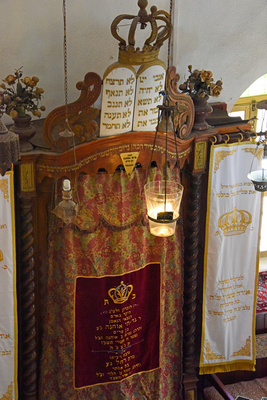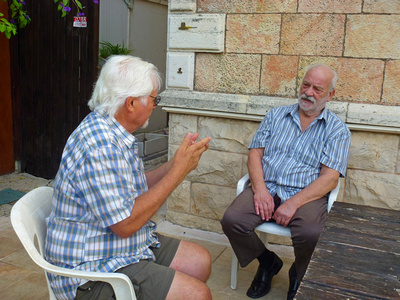REFECTIONS ON YOM KIPPUR
REFLECTIONS ON YOM KIPPUR
We have now experienced the Shofar sound of Yom T'ruach, the Days of Awe in which the REALITY of the Almighty, the Sovereign LORD God of Israel, has been the focus of attention at the Kotel, in the Synagogues and, for many, on the streets of Jerusalem, and here we are approaching the end of Yom Kippur, 5775, or, if you like, 2014.
In ways that only being in Jerusalem can facilitate, we feel the fulfilment of the Prophet Amos's words:
"In that day 'I will restore David’s fallen shelter—
I will repair its broken walls
and restore its ruins—
and will rebuild it as it used to be,
so that they may possess the remnant of Edom
and all the nations that bear my name,'
declares the Lord, who will do these things." (Amos 9:11)
Tomorrow we expect to participate in a massive prayer gathering on the Haas Promenade, a gathering that is organised by, and will include speakers from, both the Jewish and Christian contexts; the "fallen shelter" of David being "repaired" and "restored" will be clearly visible in this event. This event, of course, is only one small incident in which the fulfilment of this prophecy is visible; we have participated in many others: like participation in the prayers at the oldest Sephardic Synagogue outside of the Old City walls, or our conversations and sharing with Isaac, a fellow resident here at Allenby 2, for example. (We'll expand on these experiences face to face when we see you in person.)


But back to the topic.
A thorough examination of sinful behaviours is, at the human level, a center of these Days of Awe. These are days when the struggle to understand responsibility for one's sin, which constitutes the heart of Ezekiel 18, becomes a personal event. An event that can, depending on what one does with the struggle, conclude with LIFE.
At that point, in FAITH, Ezekiel's concluding word becomes real.
It is here that we can "get a new heart and a new spirit".
"I will judge each of you according to your own ways, declares the Sovereign Lord. Repent! Turn away from all your offenses; then sin will not be your downfall. Rid yourselves of all the offenses you have committed, and get a new heart and a new spirit. Why will you die, people of Israel? For I take no pleasure in the death of anyone, declares the Sovereign Lord. Repent and live!" (Ezekiel 18:30-32).
So, during the Days of Awe and concluding with Yom Kippur, our attention is on the Holiness of our God and the great blessing of being drawn into His Holiness so that we experience the reality of being a Holy People. What a privilege!
Rabbi Shlomo Riskin has given me pause for thought regarding the conclusion of Yom Kippur in these words from his article in Arutz Sheva:
"The climax of Yom Kippurim is its closing Ne’ilah prayer when the sun is beginning to set, when the day is beginning to wane and when we are nearing our last chance for the opportunity to receive God’s loving forgiveness for the year. The excitement of these last moments is palpable within the synagogue. The prayers are at a much higher pitch and the voices are filled with intensity.
During the periods of our national sovereignty, with the closing of the day, the holy Temple doors would close as well. Post Temple, with the setting sun, the very heavens, the pathway to the Divine Throne, and the gateway to God seems to be closing. 'Don’t lock me out' says the Jew during Ne’ilah. Don’t close the doors or the gates in my face as long as there is still time, let me come in.
But there is another way of looking at this, a very opposite way. 'Don’t lock me in!' cries the Jew during Ne’ilah. Yes, I’ve been in the Temple, or I’ve been in the synagogue almost the entire day. I’ve truly felt God’s presence and I’ve truly been warmed by His loving embrace. I feel God’s divine and gracious acceptance and His total forgiveness. I’ve spent an entire twenty-five hours in His house, in which I’ve seen the sweetness of the Lord and visited in His tent.
But now, as the doors to His house are closing, I don’t want to be locked in. After all, I began this penitential period with Rosh Hashanah, the day of God’s kingship. The prayers on Rosh Hashanah taught me that God did not choose Israel to live with Him in splendid and glorious isolation; He chose Israel to be a 'kingdom of priest-teachers and a holy nation' to bring the message of compassionate righteousness and moral justice as a blessing for all the families of the earth. We are meant to be a light unto the nations, a banner for all peoples.
It goes without saying that we need our moments of quiet contemplation, of anguished repentance and of personal outpouring to the God who gave us life and Torah. But the ultimate purpose of this day of divine fellowship is for us to be recharged to bring God’s message to the world, a world crying out for God’s Word of love, morality and peace. We must leave the ivory tower of Yom Kippur and descend into the madding and maddening crowd in the world all around us."
Yom Kippur, then, is not only an awesome, but joyous, reveling in the Holy Presence, but an inspiration to move back into our day to day world with renewed vigor and focus to do what we have been called to do: Tikkun O'lam, repair the world, or to put it another way, "We are therefore Christ's ambassadors, as though God were making his appeal through us. We implore you on Christ's behalf: Be reconciled to God."
In conclusion, I want to link our Evangelical Christian perspective with current Rabbinic teachings that have given me further understanding of our roots in Judaism; that is, the spirit of, not only the letter of, Judaism.
New Zealand friends we have met here at Allenby 2 told us of a Rabbi friend of theirs who made the observation that the two paths, Evangelical Christian and Jewish, of understanding the teaching of the Bible, although miles apart and for centuries running, at best parallel, at worst divergent, are in these days beginning to converge.
Grace and I have been experiencing that convergence in our growing friendship with another guest here, Isaac, a Jewish man born 70-some years ago in Istanbul. We have enjoyed many deep conversations during the 3 weeks since we first met him. In these conversations we know that our hearts are in the same place, and our words are often the same as well, although not always.


In this context of convergence, I conclude with a reference to Rabbi Nachman Kahana's Yom Kippur message, also in Arutz Sheva, in which he explores the significance of the "binding of Isaac" to the Yom Kippur awareness of our sinfulness and HaShem's forgiveness.
"The call to sacrifice Isaac was made by Hashem to Avraham, not to Isaac. So, in fact, Isaac had the prerogative to refuse. And had he done so, Avraham would have been exempted from his obligation due to causes beyond his control, and Isaac could not have been held liable, because as stated he was not commanded. Yet Isaac agreed to be the sacrifice demanded by Hashem of his father Avraham, for one reason. That despite the fact that Hashem did not command Isaac to give up his life, Isaac knew that it was Hashem’s will that he be sacrificed on the altar on what was to become the Temple Mount, in Yerushalayim.
By Isaac advancing the episode of the Akaida to counter Hashem’s implicit warnings that He has taken notice of our dire sins, Isaac is saying to Hashem: "You did not command me to relinquish my life at 37 years old under my father’s knife. Yet I agreed for one reason. I knew that that was your wish. We, the Jewish people, also have a wish. It is to be loyal sons to You, our Father-in- Heaven. But we are human beings, made of flesh and blood, distracted and bombarded by the yetzer hara (our corporeal instincts) which seeks to drive us away from the holy Torah. So just as I yielded to what I knew was your desire, so too, listen to the wishes of Your people Am Yisrael and forgive them for their sins.
The shofar blasts are intended to bring forth before Hashem that we Jews seek to fulfill not only the implicit mitzvot of the Written Torah and Oral Torah, but that we run to carry out even Your implied, implicit and silent wishes.
The principle of doing Hashem’s silent wishes is upon us every moment. A Jew who lives only according to the letter of the Halakha while ignoring the spirit of Halakha, is an halakhic robot who does not come even close to what a Jew should be. The taking of that "one more step" which we call 'lifnim mei’shurat hadin' (beyond the requirements of the law) is what defines a Jew as being God fearing. The Torah says we must give tzdaka (charity). So one can give money to a needy person like you throw a bone to a dog: or he can also speak to the person and give him hope that things in life have a way of turning around.
The Zohar states that there are two kinds of hell, Gehennom - one of fire and the other of ice.
I believe that the fire is for those who have committed a sin in heated passion and the Gehennom of ice awaits those who have fulfilled a mitzva with lack of passion."
For us in the Christian realm, this exploration sounds a lot like Yeshua's observation that, "Your father Abraham rejoiced at the thought of seeing my day; he saw it and was glad." (John 8:56).
You can read all of the Rabbi's article at:
MainJudaismThe Binding of Isaac and Living in Israel Judaism: The Binding of Isaac and Living in Israel
This has been a bit long, but.....